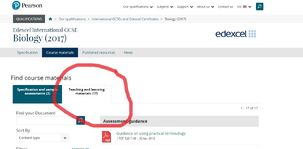Whether you're taking a DIY approach to studying for qualifications, or are using a distance learning course, this page can help. It explains how to study for qualifications without paying for a course - and covers study skills to supplement any course. It also covers revision and exam preparation techniques that are evidence-based, so you can study smarter.
The DIY Approach to Qualifications[]
Home educated students often take the 'DIY Approach' to studying for qualifications. This means that you don't pay for a distance learning course, but instead pull together resources yourself to cover the syllabus. It's not as complicated as it sounds, because the right textbook will already be a complete course for the syllabus and you can just work through it and add supplementary material to help you understand and remember. Later, you work through past exam papers to refine your exam technique and work out where there are gaps in your knowledge.
The DIY approach has worked well for many home-educated students; plenty have achieved top grades with it. However, it's down to individual preference and some people do work better with the external deadlines and interaction provided by a course. New home educators sometimes spend a lot of money on courses which turn out not to suit them very well. Before spending out on courses you may find it helpful to try a DIY approach and see if it works for you.
Distance learning courses are always an option for some or all of your subjects, as well as local tutored groups with other home educators.
How to prepare[]
Get the right textbook[]
The right textbook makes self-study much easier ; if the book is for your exact exam specification, you can often just work your way through the book and find practice questions tailored for your syllabus, and useful tips on how to approach the exam. There are dedicated textbooks available for most GCSE and IGCSE subjects; just make sure you are buying for your exact syllabus, eg "Edexcel 9-1 IGCSE English Specification A".
If you're studying for International GCSEs then it's best to get a dedicated textbook for that, rather than for the GCSE, as there will be some differences between the syllabuses.
You generally need to order a "Student book" - this is a complete course tailored to the syllabus, with plenty of practice questions. You won't find these on the high street though - the books in general bookshops are usually "revision guides", which summarise the course and don't contain all the material you need. If you are looking for a textbook for Edexcel Biology for example, see recommended books on the Biology page, and search online booksellers for 'Edexcel IGCSE student book Biology'.
Often the exam board (eg Pearson Edexcel, CAIE/Cambridge) will publish its own Student Book, and you can be confident that this will cover the whole syllabus. However, there are also Student Books published by other companies (eg Hodder, Collins) but for each syllabus, and some of these are endorsed by the exam board too. As long as the book is dedicated to the syllabus you have chosen, it should cover the course. It's really down to which books work well for your family, and which layout you prefer.
Where Are The Answers?[]
A caution - some Student Books contain answers for all exercises, or make answers to all exercises available online, but others only publish answers in an expensive teacher's book which may cost £100 or so. Check on this wiki's individual subject pages to see what's on offer in your subject.
How to get the most out of the textbook[]
Some textbooks are easier to self-study from than others.
A 'Student Book' intended for use in schools will often have sections designed to be one lesson's worth of work, with practice exercises, which correspond to specific parts of the syllabus. Maths textbooks often follow this format. In this case, the textbook might provide all you need. Other subjects may have textbooks with larger chapters and it may be harder to break the work down into manageable chunks. In this case, a scheme of work, resources from eg TES online, or from study websites, can be very helpful.
Be Your Own Teacher - How To Study A Textbook
Plan your work schedule[]
This isn't as difficult as it may sound. You could go through the specification and work out when you're going to do each topic, but the textbook publisher and the exam board subject specialists may have already done the hard work part of this. As noted above, in a Student Book sections are often planned to be one school lesson's worth.
If you're self-studying from a textbook which covers your exact exam specification, one popular technique is to count the number of weeks until the exam, take off 6-8 weeks for revision, then count up the number of sections/ exercises in the book, and work out how many exercises/sections you need to do a week to complete the book comfortably.
If you are using a distance learning course, the course provider should provide a timetable and guidance on this.
Is there a Scheme of Work from the exam board?[]

Look at the teacher resources (if available) for your syllabus. Edexcel usually provide a free, editable scheme of work which divides the whole syllabus up into lessons, with suggested resources such as videos, activities and links. For example, go to the Edexcel International GCSE Biology page and click on the 'Teaching and learning materials' tab.- see screenshot.

Scroll down to 'Scheme of Work'. You can download this and edit/amend it for your own purposes. It's like a course guide for the entire syllabus. Other exam boards often provide similar teacher support materials, although they may be behind a teacher login.
Supplement with video tutorials and multimedia lessons[]
You can usually find video lessons on any topic in the exam syllabus on YouTube. Many teachers have created videos and often these are very entertaining. Watch these videos for an introduction to the topic before you read the textbook, or a recap afterwards - whichever works for you.
You will often find videos for your exact syllabus, but if you're studying for IGCSE, search for resources for GCSE too so that you get more results. For example, if you're doing IGCSE Biology search for 'IGCSE Biology cells ' and also 'GCSE Biology cells'. Videos for other specifications may not cover the exact same content but will have useful material and in many subjects the syllabuses are very similar.
BBC Bitesize covers most of the UK curriculum with multimedia presentations and online exercises. You can use this to supplement or introduce a topic.
There are some subscription channels which can be very helpful - see if they offer a free trial, or ask on the HE Exams groups to see if others think they're worth the expense. For some, there may be a home education discount available.
You may find some subject-specific resources recommended on this wiki's page for that subject. If you find something good that isn't on there, please do add it by commenting on the wiki.
Reinforce with free online material[]
Look at sites like Quizlet and Memrise (links below in Online Revision Programs and Resources) to find free studying resources for your topic. Often, students or teachers will have made revision sets for specific topics within a syllabus, so it's worth investing some time searching through. Don't leave this until the revision period - you can locate and bookmark resources while you're working on a topic, then you can periodically use them to refresh and reinforce your learning.
Past Papers[]
Once you've worked through the course, whether that is via a textbook, correspondence course, with a tutor etc, you will need to spend some time doing practice papers / mock exams. Most students find this a valuable experience.
You can usually download past exam papers, mark schemes and examiners' reports from the page on the exam board for that particular qualification; we have a page on Past Papers with more advice and links to download sites. Have a look at the subject pages on this wiki for more resources on each subject (see Main Page for list of subjects), and if you're still short of material, post on the HE-Exams list to ask for suggestions. The most recent past paper will normally be secure download only from the exam board as schools use these for mocks. The exam boards will not allow home educators to download these from their sites, but you can usually source a copy via the HE-Exams groups.
- When doing practice papers, students may find it helpful to mark it themselves and become familiar with the mark scheme so they know what markers are looking for. Read the Examiner's Report too - reading about other people's mistakes may save you from making some yourself!
- Pay attention to timing; during practice exams, divide the total number of marks by the minutes available so you have a 'marks per minute' number. Then, when you look at the number of marks available for a question, you know roughly how long to allow for it.
- The marks available tell you also how many points you need to make in an answer. If there are 3 marks available, generally you need to make at least 3 points - even if this involves spelling out something you think is obvious.
- Do some past papers under exam conditions - in a quiet room, with strict exam timings - to help you pace yourself.
- If you have some revision time available, but don't have time or stamina to work through a full past paper, you don't need to do one all in one go. Look at the marks per minute, as noted above, and give yourself questions to suit the available time.
- You may need to look at the previous specification if there are not many past papers available for your qualification. Often the changes between specifications are quite small so you may find that the old papers are still good practice. The exam board may have a document explaining changes from one specification to the next, available under 'teacher support materials' on the subject page. Otherwise, you need to look for questions which are similar in style to the current ones, and compare the specifications.
Getting past papers marked[]
Parents and candidates can learn to mark past papers, and it's a good exercise for the candidate to mark their own work. Make sure you read the Examiner's Report as well as the mark scheme. It can take a while to get used to it all so save the most recent past papers for last and get the hang of it with older ones.
Some subjects are harder to mark than others. You could ask a tutor to mark them for you - either someone local to you, or an online tutor. There is a company called 'Mark My Papers' which was set up by a home educator specialising in providing this service. To use these services effectively you need to allow time for the tutor to mark, and for the candidate to act on their feedback - so this isn't something to do at the last minute.
Revision Tips[]
There has been plenty of research looking at revision techniques to try to find out which ones do help people remember information, and which don't. The articles listed here mostly explain research from cognitive neuroscience. Your own experience may be different, but this is a summary of what works in trials.
Things which don't work well for most people:-[]
- Re-reading your notes
- highlighting
- copying out notes.
- Cramming - trying to revise a subject all in one go
- Having background music, social media or phones around consistently reduces recall in studies.
Things which do work well, on average:-[]
- Testing - 'retrieval practice' makes you more immune to exam stress and helps to embed facts in long-term memory.
- Working with others who have a good work ethic.
- Spaced repetition - revising at intervals
- Interleaving - mixing up revision of different subjects
Articles on effective revision techniques[]
Revision Techniques That Work - brilliant booklet from St Neot's Sixth Form centre which explains evidence-based revision techniques in detail. Highly recommended.
Revision Techniques - The Good, The OK, and The Useless - BBC article on evidence-based techniques. Overview.
All In The Mind from BBC Radio 4, on which revision techniques work.
Five Proven Hacks to Help Students Tackle Revision - some useful detail from The Guardian, with links to research.
Top 10 Revision Strategies, from The Confident Teacher - really good article with lots of detail on a variety of methods eg graphical revision techniques.
The Science of Revision - 9 ways to revise more effectively, from The Guardian.
Online Revision Programs and Resources[]
Quizlet - Free online study tool site offering screen flashcards and various games and options to help you learn them. Search for a ready-made set on your subjects (eg 'Biology IGCSE'), or make your own.
Memrise - mnemonic program. Search for your subject or create your own course. Especially good for languages but used for other subjects too.
Coggle - free Mind Mapping-style program
GetRevising.co.uk - free site with tools to create mind maps, flashcards, revision timetables and more.
MindMeister free Mind Map software
